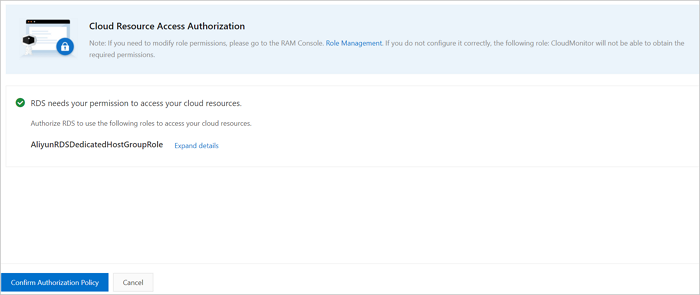Before you can use the features of ApsaraDB for MyBase, you must create a dedicated cluster in ApsaraDB for MyBase.
Background information
For more information about ApsaraDB for MyBase, see What is ApsaraDB for MyBase?
Usage notes
In the Thailand (Bangkok) region, you can create dedicated clusters that run only the SQL Server engine.
By default, the following overcommit metrics are configured for dedicated clusters:
CPU Overcommit Ratio for MySQL and SQL Server: 200%
Storage Overcommit Ratio for MySQL and SQL Server: 100%
Maximum Memory Usage for MySQL and SQL Server: 100%
After you create a dedicated cluster, you can modify the overcommit metrics based on your business requirements. For more information, see Configure resource overcommitment to reduce costs.
Procedure
Log on to the ApsaraDB for MyBase console.
In the upper-left corner of the page, select a region.
On the Dedicated Clusters page, click Create Dedicated Cluster.
In the Create Dedicated Cluster panel, configure the parameters that are described in the following table.
Parameter
Description
Database Engine
The database engine of the dedicated cluster. The MySQL and SQL Server engines are supported.
ImportantYou must select a database engine, so that you can select the corresponding operating system (OS) image when you create a host and select the corresponding database engine when you create an instance.
After you create a dedicated cluster, you cannot change the database engine. Make sure that you select an appropriate database engine.
Architecture
The edition of the dedicated cluster. This parameter is available only when you set the Database Engine parameter to MySQL. This parameter is automatically set to High-availability Edition.
Dedicated Cluster Name
The name of the dedicated cluster.
VPC
The virtual private cloud (VPC) in which you want to create the dedicated cluster. If you want to create a VPC, log on to the VPC console.
ImportantAfter a dedicated cluster is created, you cannot change the VPC. Make sure that you select an appropriate VPC.
Resource Allocation Policy
The default policy that is used to allocate resources in the dedicated cluster. Valid values:
Balanced Allocation: The system preferentially creates database instances on the hosts where no resources or fewer resources are allocated. This maximizes system stability.
Compact Allocation: The system preferentially creates database instances on the hosts that are created earlier and have more allocated resources. This maximizes resource utilization.
Host Troubleshooting Policy
The policy that is used to handle host failures. Valid values:
Automatic Host Replacement: The system automatically replaces the faulty hosts.
NoteIf a faulty host uses enhanced SSDs (ESSDs), the host is automatically replaced after the computing resources on the ESSDs are migrated to another host.
If a faulty host uses local SSDs, the host is replaced only after all instances are removed from the host.
Manual Host Replacement: You must manually replace the faulty hosts.
NoteThis parameter is available only when you set the Database Engine parameter to MySQL. For other database engines, faulty hosts are automatically replaced.
Grant OS Permissions
Specifies whether to grant the host OS permissions.
NoteIf the host OS permissions are granted on a dedicated cluster that runs the MySQL or SQL Server database engine, you can log on to the hosts in the dedicated cluster to perform operations such as upload, download, and installation of software. After you create a dedicated cluster, you cannot change the setting of Grant OS Permissions. Proceed with caution.
(Optional) The first time you create an ApsaraDB for MyBase dedicated cluster, the following message appears in the lower part of the panel. You must grant permissions on elastic network interfaces (ENIs) and security groups of Elastic Compute Service (ECS). Click Authorize Now. On the Cloud Resource Access Authorization page, click Confirm Authorization Policy.
 Note
NoteAfter you grant permissions, the AliyunRDSDedicatedHostGroupRole role is displayed on the Roles page of the Resource Access Management (RAM) console. If you want to use ApsaraDB for MyBase dedicated clusters, retain this role. If this role is deleted, you must grant the permissions again to create a dedicated cluster.
Click OK.
Learn more
You can join the DingTalk group 32484333 to obtain technical support from database experts, view success stories, and engage with experts on live streams that are provided on a regular basis.
What to do next
After you create a dedicated cluster, you can create hosts in the dedicated cluster. You can also manage the dedicated cluster. For more information, see Create a host and Manage ApsaraDB for MyBase dedicated clusters.